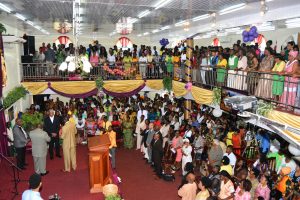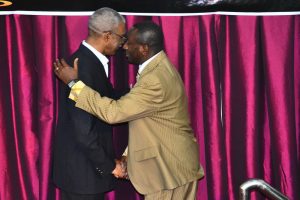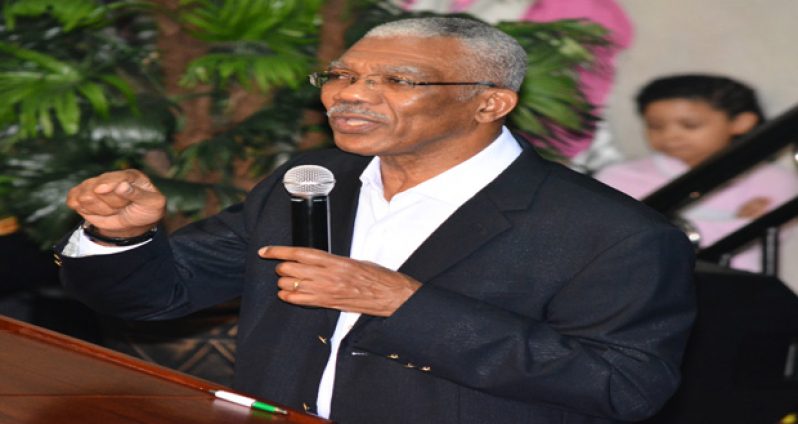FEATURED as the guest speaker at the seventh anniversary celebration of the Freedom Life Ministries yesterday, Guyana’s leader, President David Granger urged the congregation to recognise that the family is the foundation upon which a nation is built, as he underscored the significance of Emancipation to the social orientation of Guyana.A standing ovation greeted the President, who arrived at the Princes Street location, neatly dressed in a lily white shirt, complemented by a pair of black pants and a tailored black jacket. The

omission of a tie had been the perfect call, since it reflected a deviation from stereotypical Euro-centric suited outfit.
Taking to the podium to face a congregation of which he himself is routinely a part, given that he is a Believer in the Christian faith, the well-postured Guyanese leader reflected on the celebrations of Emancipation just two days earlier, advising the people to examine the day as a National Day, and not one limited to African celebrations.
According to President Granger, 177 years ago, Africans won their freedom, which paved the way for East Indians, Portuguese and Chinese to be transported to Guyana, which is now reflected in the present multi-ethnic society. He contended then that Emancipation Day should be considered a national day, because “it was the day Guyana was born.”
Rhetorically questioning what did Emancipation mean to Guyana and Guyanese, the Head of State said: “It meant that we had a new start to life; our fore-parents had emerged from the most abominable system ever known to humanity. Our fore-parents emerged from that inhumane system and they built a house; a house on four pillars.”
THE FOUR PILLARS
The first pillar which was alluded to by the President was that of the family. A historian too, the Head of State explained that during the period of slavery in Guyana, Africans were not allowed to marry, as their rights were “taken away” from them.
“Wives and children were separated and they had no rights. So as soon as these people got the opportunity, they walked off the plantation and built homes for their families to have somewhere to live,” he told the gathering of a few hundred yesterday.
These positive actions by the freed Africans 177 years ago, he said, is what is remembered today as the family is the foundation of any nation.

The second pillar, he told the congregation, was that of the church. “They [the freed Africans] built churches with the little that they had. They didn’t send overseas for grants from missionaries, they built their own churches” President Granger noted.
But this, he said, had been a result of the people being dedicated to the worship of God and them being spiritually driven. Even today, he suggested, if one is to “throw a brick up” in any of the traditional African villages, there is a high possibility that it would land on a church.
To this end, Granger reflected on the two-day 1823 Demerara rebellion which was an uprising on August 18, involving more than 10,000 slaves that took place in the Crown colony of Demerara-Essequibo, now part of Guyana.
Underscoring the importance of a balanced academic life, the Head of State revealed the third pillar as the school. During post-Emancipation, he said, Africans began to remove children from fields where they traditionally worked and pushed them to be educated, which resulted in them becoming the first village overseers, the first clerks and the first priests. But this was only made possible because they were given the opportunity to have an education, he added.
ABSENTEEISM IN SCHOOLS
Pleading with the members of the congregation not to ignore the importance of education, and its role in today’s society, the President detailed his experience of travelling to the Pomeroon and the Rupununi, and witnessing absenteeism from school due to the lack of financial resources and basic necessities such as food and shoes.
“In the Pomeroon, people are paying $4000-5000 a week to send their children to school; and you know that in every community, children are not going to school because they don’t have food or money. But school was very important to our foreparents 177 years ago, and it is important to us now,” he said, adding that “Nobody must stay home or skulk because there is no transportation, or bus or meals.”

The final pillar upon which Guyana was built by our fore-parents, Granger noted, was that of work. Work was needed for the sustenance of our fore-parents, he said, as they had to grow food on farms.
SELF-RELIANCE
According to the leader, “They [our fore-parents] ate what they grew and they were self-reliant. So let us get the idea out of our heads that we can survive without working. Those who had farms were able to produce a few chickens, some cassava, yam, eddo and plantain, and that was the money they saved to buy those plantations from the English planters.”
As a result, he noted, we too must learn to save our financial resources and appreciate the value of work. He charged that Guyanese must be able to produce also.
With those few words eloquently delivered without the guidance of a script, the Head of State closed his address to the gathering by urging them: “Let us look back in order to look forward; Let’s picture the house that our fore-parents created and reflect on the four pillars which the home was built on.”
By Ravin Singh




.png)









